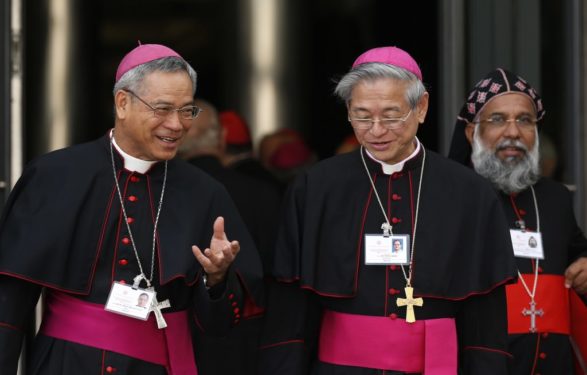By Hernan Reyes Alcaide

TAIPEI – Folliwing the historic agreement signed between the Vatican and China for the joint appointment of bishops last Sept. 22, a leader of the Catholic Church in Taiwan says he’s “not concerned” about his island nation being left out in the cold.
“We’re happy for the progress” the agreement implies, said the Archbishop of Taipei, John Hung Shan-chuan, in an interview on Sunday at a church in Taiwan’s capital after he finished saying Mass.
The Holy See is the only European state that recognizes Taiwan, and for this reason the relationship between the Holy See and the Asian giant is closely watched in Taipei.
But even from the political power in control of the island, the first words were of tranquility. For instance, the ambassador to the Holy See, Matthew Lee, this week underlined the agreement signed in Beijing last month as significant because for the first time it recognizes the leadership of the pope in the Catholic Chinese community.
Head of a 7-men bishops’ conference since 2007, the archbishop of Taiwan’s capital is quiet after celebrating Mass, with people sitting on red plastic stools in the courtyard and an audience of all ages who came early to the building in central Taipei, confirming the sayings regarding the deep devotion of the small Taiwanese Catholic community of about 300,000 people.
On Tuesday, during the celebration of the anniversary of the 107th anniversary of Taiwan’s independence that was organized at the Pontifical Urbanianum University, Lee reinforced the idea that the provisional agreement between China and the Holy See “exclusively concerns religious issues, with no diplomatic nature, and marks the first step taken by the Holy See to confront ecclesiastical issues that have been unresolved for some time.”
In the first row, listening to Lee’s statements, was an important figure: the undersecretary for relations with States of the Vatican’s Secretary of State, Monsignor Antoine Camilleri. He was the man tasked with signing the agreement in Beijing on Saturday, three days before.
Reyes: Excellency, a few months ago the seven bishops of Taiwan had their ad limina visit to the Vatican. How has the tone been since then been?
Archbishop Hung Shan-chuan: After the Ad Limina visit we continued working as usual. What we did was tell Pope Francis about what we are doing here. We have several Catholics, but few vocations. He asked us, and we told him that we have only 10 seminarians, so there are years with perhaps only one ordination in all of Taiwan. That is one of the central issues.
And also when we were there, we invited him to come. Or that he maybe sends us a video for next year’s Eucharistic Congress, so we can see him here even if he can’t come. And he promised us he was going to send us something.
Recently, the signing of an agreement between China and the Vatican took place, to designate bishops together. How does the Church in your country see this development?
We don’t know the content yet, so we can say little. What we can say is that we were informed ahead of time that the agreement was happening. What we see is that for the first time, the Communist Party is trembling. They say they don’t want foreign powers to get into their country, but this time they have allowed it. And that’s a good sign, although we don’t know what the consequences will be in the future. But we are not worried, because the pope told us that he was not going to abandon or hurt Taiwan. We asked him that, and we know that as a good shepherd he will not abandon us.
You seem to be drawing a positive balance…
We are happy to see that there is progress, because it was talked about for many years and nothing happened. And this time it happened. The illegal bishops will be recognized, and two of them will participate in the [Oct. 3-28] Synod on youth.
Do you think that this agreement, added to the invitation that you extended, could open the door to a papal visit to China and Taiwan?
It is too early perhaps for a visit from the pope. Because we also don’t know yet if the Communist Party is going to comply. We have to wait. We are going to continue our collaboration with the Church of China for the time being.
Do you think that this opens a new path of opportunities?
This agreement is only a first step, a beginning and not an end.
This week begins the Synod of Bishops dedicated to “Youth, faith and vocational discernment.” Will there be a delegation from Taiwan?
Bishop Thomas An-zu Chung of the Diocese of Chiayi will represent us at the Synod. At each Synod we send a representative. We will also send a delegation to World Youth Day in Panama in January 2019. The future of young people is important for the future of the Church. The future of the Church belongs to them.
The interview originally appeared in Religión Digital. It is reprinted here with permission.
